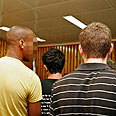
Gaza mom says convicted troops traumatized her son
Mother of boy ordered by soldiers to open potentially dangerous bags says after trial that they must be punished. 'When shot was fired at bag and his sister yelled, 'They killed Majd', I felt like I was suffocating,' she recounts
"When they took Majd I felt enormous fear because I was sure they were going to kill him. When the shot was fired at the bag and his little sister yelled, 'They killed Majd' I felt like I was suffocating," Afaf Rabah said after a military court convicted the two soldiers involved in the incident, which occurred during Operation Cast Lead in Gaza.
Afaf added that she and her neighbors had been in the building's bomb shelter when an IDF force raided it. "Majd was standing next to me and they pointed in our direction. I was sure they wanted to talk to me. I asked him, 'What do you want?' but then he pointed at the boy again," she recounted.
"I was afraid, and then the soldiers pulled him away and took him out of the room we were in. Then I didn't see him until after the shot was fired. That was a horrifying moment. There are no words to express what I felt," she said.
The court found that the two Givati soldiers on trial had ordered the boy to open a few bags, thought to contain explosives. The boy opened a number of bags and spread out their contents, and when he feared opening the last one they removed him from the vicinity and fired at it. He was then returned to his mother.
The Military Prosecution is expected to ask the court to send the soldiers to prison, despite the fact that the incident took place nearly two years ago and the soldiers have since been released from the army.
A source familiar with the affair said, "Of course no one wants them to receive the maximum sentence of three years, but it important that justice be served to deter other soldiers from committing similar acts."
Majd is currently almost 12 years old, and a student in the seventh grade. His mother says he has since the incident demanded that their apartment be kept locked. "He won't lock it, but asks me or his sisters to do so. Once in a while he asks me where we will go if another war breaks out," she said.
Afaf added that the court's verdict was not, in itself, sufficient compensation for her. "If they are really punished then that will be a compensation of sorts, even minimal, for the moments they made us pass, without their lives being at all at risk," she said.
"It was the first time I had seen Israelis, certainly armed Israelis, face to face. These were difficult moments and if the soldiers receive a real punishment then this will satisfy us, but we will never forget those awful moments."
'Soldiers wanted to steal'
But the mother is not the only party left seething by the occurrence. Abed al-Hadi, a 50-year old resident of the building in Tel al-Hawa, is the owner of the bag Majd refused to open.
"No trial can compensate for those moments. Besides, they shot my bag, which contained a passport, money, and a little gold we were afraid to leave in the apartment. The money disappeared and so did the gold. I am convinced the soldiers wanted to steal it," he said.
Al-Hadi recounted the minutes leading up to the incident. "The soldiers started firing phosphorous bombs at our building. My house was burned and we went quickly down to the shelter. They separated us from the women and children and some of us were tied up. One of the soldiers asked whose bag it was. I said, 'Mine. Do you want me to open it?' But he ordered me to stay where I was and hit me with the rifle butt. The soldiers took the boy and asked him to open it, but he couldn't because I had locked it with a coded lock. When Majd couldn't open it they hit him and shot the bag," he said.
Afterwards, al-Hadi said, he felt ill because the soldier had hit him, so he was treated by a medic belonging to the force. "What's certain is that at that time the soldiers' lives were not in danger. Just the opposite, after that they turned the building into their headquarters, slept in our apartments, and even cooked their meals there. Is that what soldiers in danger do? Why did they have to shoot the bag? We were sure they had killed the boy," he concluded.
Hanan Greenberg contributed to the report
- Follow Ynetnews on Facebook










